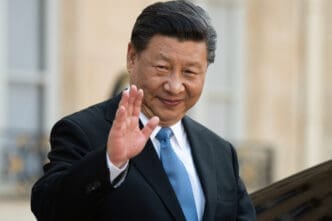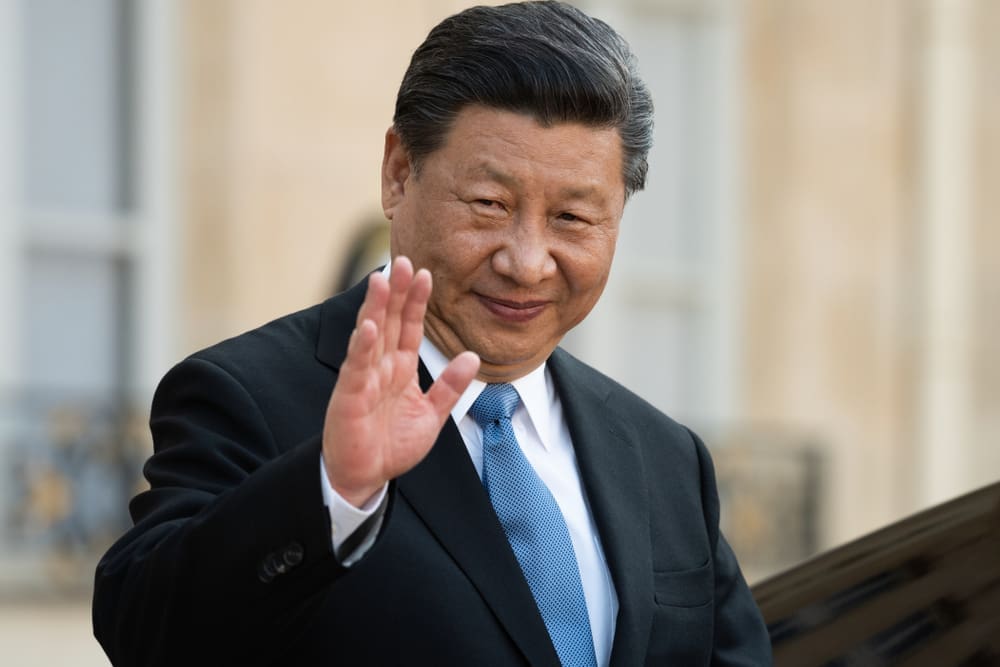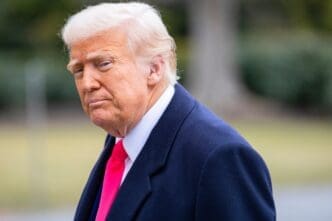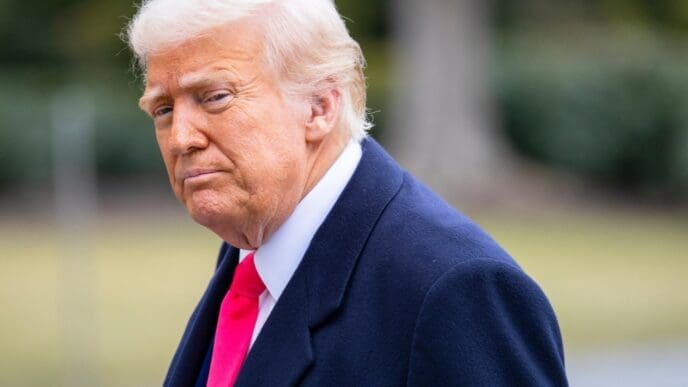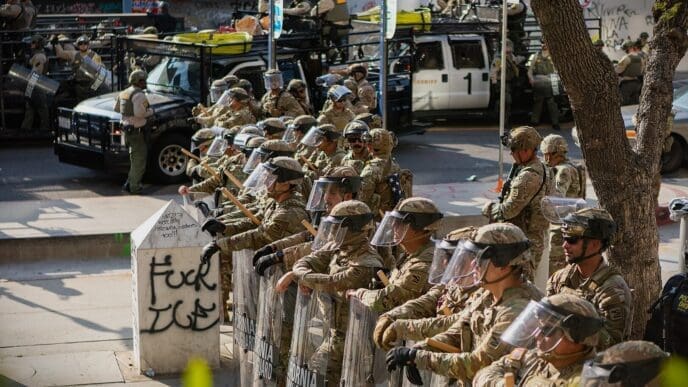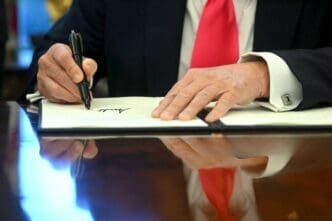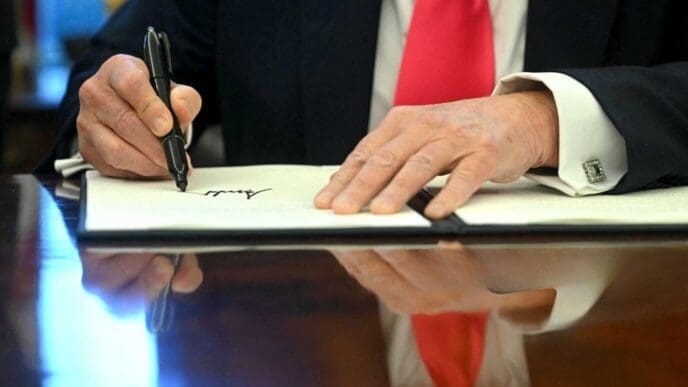Executive Summary
- President Trump strongly condemned Chinese leader Xi Jinping’s hosting of Russian President Vladimir Putin and North Korean leader Kim Jong Un, labeling the gathering a “conspiracy against The United States of America.”
- China is strategically leveraging perceived U.S. foreign policy “missteps” under President Trump to showcase its growing global power and explore alternative international affiliations, potentially consolidating an anti-Western bloc.
- President Trump’s “America First” policies and aggressive trade actions are reportedly alienating traditional U.S. allies, such as India, pushing them closer to China and Russia and accelerating a shift in global power dynamics.
The Story So Far
- President Trump’s “America First” foreign policy, characterized by aggressive trade tactics and perceived attacks on traditional allies, has inadvertently created an environment where nations like China, Russia, and North Korea are consolidating an anti-Western bloc. This strategic shift is seen by some as China leveraging the United States’ “erratic foreign policy” and the limited success of Trump’s personal diplomacy with authoritarian leaders to showcase its own global power and challenge U.S. influence.
Why This Matters
- President Trump’s strong disapproval of China hosting Russian President Vladimir Putin and North Korean leader Kim Jong Un highlights concerns that his “America First” foreign policy may be inadvertently consolidating an anti-Western bloc, potentially accelerating a shift in global power dynamics as nations like India explore alternatives to U.S. leadership.
Who Thinks What?
- President Donald Trump views the gathering of Chinese, Russian, and North Korean leaders as a “conspiracy against The United States of America” and a deliberate affront, maintaining that China needs the U.S. more and will eventually “capitulate,” while his supporters assert his “America First” foreign policy has been a success.
- Some analysts and observers perceive China’s diplomatic maneuvers as a strategic effort to capitalize on the United States’ “erratic foreign policy” and consolidate an anti-Western bloc, potentially accelerating a shift in global power dynamics and pushing traditional U.S. allies towards alternative superpowers.
- Other observers suggest that concerns about a new “axis of resistance” may be overstated, noting that the nations involved lack formal defense agreements or pooled economic sovereignty, and that internal tensions exist within the emerging bloc, with U.S. military leaders indicating they are not deterred by such events.
President Donald Trump expressed strong disapproval following Chinese leader Xi Jinping’s hosting of Russian President Vladimir Putin and North Korean leader Kim Jong Un at a military parade in Beijing, an event that highlighted a growing alignment of anti-Western powers. Trump, reacting on social media late Tuesday, perceived the gatherings as a deliberate affront and a “conspiracy against The United States of America,” underscoring concerns that his “America First” foreign policy may be inadvertently consolidating a bloc of nations seeking to challenge U.S. global influence.
Trump’s Outburst and Diplomatic Frustrations
President Trump’s public reaction came as television footage showed the Chinese leader welcoming the authoritarian heads of Russia and North Korea. “Please give my warmest regards to Vladimir Putin, and Kim Jong Un, as you conspire against The United States of America,” Trump wrote in a message directed at Xi Jinping on Truth Social.
This public display of anger follows a period where Trump’s personal diplomacy with such leaders has yielded limited results. His meeting with President Putin in Alaska last month, despite a “gushing red-carpet welcome,” has not led to progress in ending the conflict in Ukraine. Similarly, President Trump’s first-term summits with Kim Jong Un did not prevent North Korea from increasing its nuclear weapons arsenal.
President Trump also used his social media platform to recall the significant American sacrifices made during the struggle against Imperial Japan, the 80th anniversary of whose defeat was commemorated in Beijing. “Many Americans died in China’s quest for Victory and Glory. I hope that they are rightfully Honored and Remembered for their Bravery and Sacrifice!” he wrote.
China’s Strategic Maneuvers
China’s recent celebrations and diplomatic engagements, including a Shanghai Cooperation Organization summit in Tianjin, are seen by some analysts as a strategic effort to capitalize on what they describe as the United States’ “erratic foreign policy” under President Trump. These events aim to showcase China’s emerging global power and explore alternative international affiliations, potentially shifting global power dynamics to the East.
Jackie S.H. Wong, an assistant professor of international studies at the American University of Sharjah, noted that “China is leveraging the missteps or mistakes that the US (is making).” The gathering of anti-Western powers is viewed by some as an early indication that Trump’s second-term policies, characterized by tariff coercion and “America First” nationalism, may be counterproductive.
Assessing the Anti-Western Bloc
While some observers express alarm about the formation of a new “axis of resistance” against the U.S., others suggest such concerns may be overstated. Nations participating in the Shanghai Cooperation Organization summit, for instance, lack formal defense agreements or pooled economic sovereignty comparable to alliances like NATO or the European Union. Internal tensions, such as those between China and India, and Russia’s adjustment to a junior superpower role relative to China, also present complexities within this emerging bloc.
Despite these caveats, the recent festivities in China are part of a broader push to demonstrate its growing might and to test alternative global systems. By convening leaders from various regions, China appears to be showcasing its capacity to challenge U.S. global power on multiple fronts. Gen. Kevin Schneider, commander of the U.S. Pacific Air Forces, downplayed the immediate significance, stating, “Nations like China and North Korea and Russia, and others do these kind of events. There’s certainly a big focus on messaging… But I think the takeaway for this is we are not deterred.”
Impact on US Alliances and Influence
The source article suggests that President Trump’s approach, including attacks on allies and efforts to undermine foreign aid programs, is fostering resentment among traditional American partners. These nations are reportedly “hedging their bets” with alternative superpowers, a trend that some analysts believe is accelerating a shift in global power dynamics.
President Trump’s aggressive trade policies, particularly against Beijing, have been highlighted as potentially counterproductive. The article argues that by engaging China in a trade offensive, Trump targeted a nation willing to absorb economic pain, leading to China leveraging its control over crucial resources like rare earth metals. This situation, combined with capricious tariff attacks on trading partners and attempts to influence the Federal Reserve, is seen by some as bolstering China’s claims of being a stable superpower, a perception previously lacking credibility.
The Case of India
A notable example of this trend is the interaction with Indian Prime Minister Narendra Modi. Despite a previously strong rapport with President Trump, actions such as a 50% tariff on Indian imports and Trump’s claims regarding India-Pakistan relations reportedly infuriated Modi. This has seemingly pushed India, a member of the U.S. “Quad” grouping (with Australia and Japan), closer to China and Russia. Modi was observed engaging jovially with both Xi Jinping and Vladimir Putin, with the latter even inviting Modi into his limousine for an hour-long discussion—a gesture previously extended to Trump in Alaska.
Jackie S.H. Wong commented that India is “signaling to the US that ‘we have alternatives, and China can be that alternative.’” The article attributes this misstep to a potential lack of understanding of India’s sensitivities regarding its colonial history and its rivalry with Pakistan, possibly exacerbated by a reported “purge of State Department experts.”
Trump’s Self-Perception and Domestic Actions
Despite critical analyses of his foreign policy, President Trump’s supporters maintain that his approach has been a resounding success. The White House, according to the article, asserts that the United States is more respected globally than ever before and credits Trump as the “President of Peace” for ending several global conflicts.
President Trump himself conveyed confidence, telling a CNN contributor that he was “not concerned at all” by the diplomatic signals from China. He also suggested to reporters that Xi Jinping would eventually “capitulate,” stating, “China needs us. And I have a very good relationship with President Xi, as you know. But China needs us much more than we need them.”
Concurrently, President Trump has made overt attempts to project a strong image, including authorizing a U.S. strike off Venezuela targeting alleged drug traffickers and reiterating threats to deploy National Guard reservists to Chicago. These actions, aimed at normalizing military involvement in law enforcement, have faced legal challenges, with a judge ruling his earlier dispatch of federal troops to Los Angeles as illegal, highlighting the presence of democratic safeguards absent in countries like Russia and China.
While President Trump has achieved some notable successes, such as increased defense spending pledges from NATO allies and a flow of tariff revenue into the Treasury, the recent events in China signal a critical challenge to U.S. global power. The article suggests that the flattery Trump has received from foreign leaders may be creating a skewed perception of how the rest of the world views the United States. As President Trump stated, “Our country is the hottest country in the world right now… Everybody’s talking about the USA.” However, the gatherings in China this week suggest that while the U.S. remains a central topic, the discussions may not always align with President Trump’s intended narrative.

